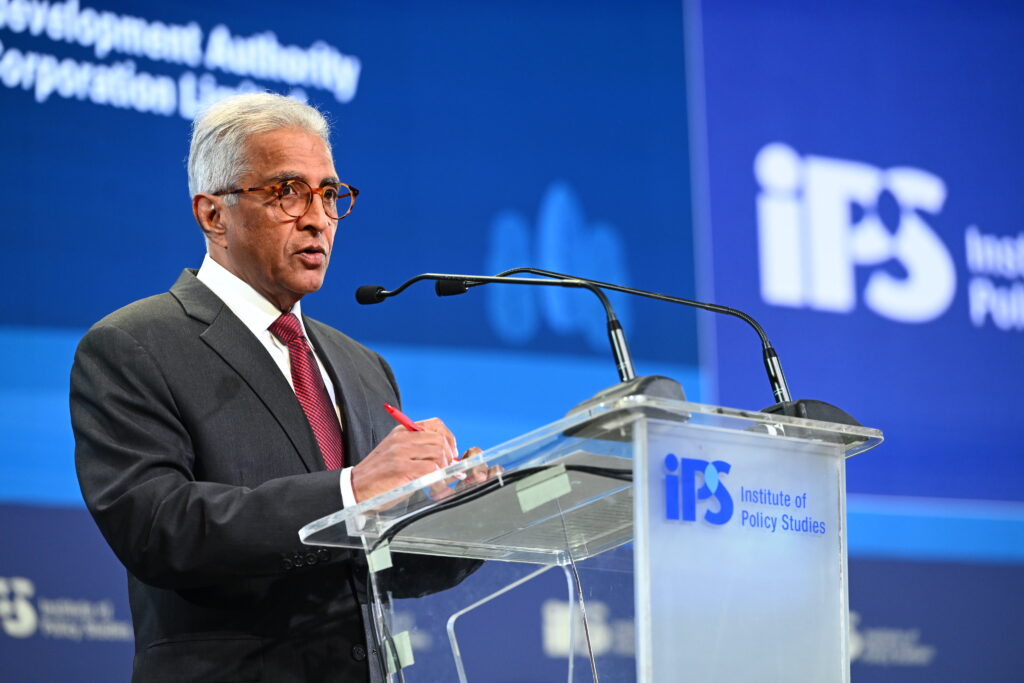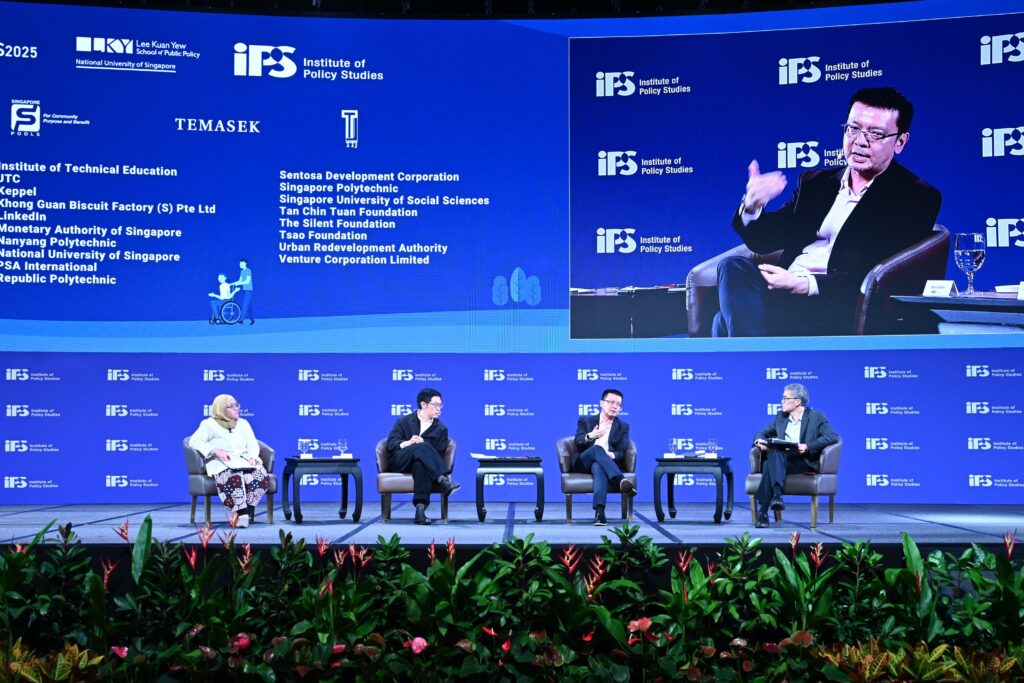Building national strength on neighbourhood ties
February 6, 2025
IN BRIEF | 5 min read
- In three panel sessions on Community and the State, Community and the Market, and Community and the Polity, speakers at the Institute of Policy Studies’ (IPS) annual Singapore Perspectives conference on 20 January 2025 reflected on how far the country has come and what is needed to take it forward in an increasingly divided world.

Lively gatherings, shared resources, and warm feelings of identity and belonging come to mind when strong communities are mentioned. Simple as these benefits may seem, they contribute to an important concept called social capital that influences a country’s success in weathering a crisis like the COVID-19 pandemic and even predicts crime rates in neighbourhoods.
Described as the value derived from social networks, social capital involves elements like interpersonal relationships, a shared sense of identity, and trust within and between various groups in communities. When social capital is high in a community, members are motivated to help one another to solve problems large and small and unite in the face of challenges.
The concept was discussed at length at the Institute of Policy Studies’ (IPS) annual Singapore Perspectives conference on 20 January 2025, where the theme of “Community” took on deeper meaning in the context of the 60th anniversary of Singapore’s independence and an upcoming general election. In three panel sessions on Community and the State, Community and the Market, and Community and the Polity, speakers reflected on how far the country has come and what is needed to take it forward in an increasingly divided world.
Mr Edwin Tong, Minister for Culture, Community and Youth and Second Minister for Law, noted that the original principles established at independence – to adopt an open posture towards the rest of the world and to create a Singapore for Singaporeans that rises above “tribal instincts” while protecting differences in religion and culture – have served the nation well. Nevertheless, Singaporeans must continue to work together to avoid becoming divided over issues like ethnicity, religion, socioeconomic status, age, and sexual orientation.
Said Mr Tong: “Our ability to forge a strong collective ‘We’ as opposed to ‘Me’, whilst enabling and even encouraging diversities to come forward, sharing perspectives, and having collective aspirations will give us the space to flourish. This, I believe, will be the key to our continued success.”
The payoff from social capital
In his opening speech, IPS director Mr Janadas Devan recalled the impact of social capital in the COVID-19 pandemic, when Singaporeans behaved in socially responsible ways, looked out for one another regardless of background, and showed appreciation and respect to essential workers.
A study published in The Lancet in 2022 found that countries with strong social capital, measured by indicators like high trust in government and high interpersonal trust, did better in controlling COVID-19 infection rates and achieving high vaccine coverage.
“We routinely cite social cohesion, solidarity, as one of the factors in Singapore’s success. This nostrum may sound like a cliché to some, even propaganda. But as we saw in the pandemic, social cohesion literally saves lives,” said Mr Devan.

The link between social capital and crime rates was brought up in the session on Community and the Polity by Mr Chng Kai Fong, Permanent Secretary (Information and Development) at the Ministry of Digital Development and Information.
Mr Chng noted that crime rates are lower in neighbourhoods with high social capital, such as those where residents know their neighbours’ first names. Such social ties encourage specific reciprocity, where behaviours are shaped by interactions between individuals, he explained. “If (I) cheat somebody, other people will hear about it from the neighbourhood. So the more I cheat, the more I lose because no one’s going to do business with me.”
However, an even more powerful product of social capital is generalised reciprocity, where community members are motivated to show kindness to others without expecting a direct benefit, said Mr Chng.
“I will be nice to you and help you because in this community, others are nice to me. I can trust that the doctor down the street, the next-door technician, they’re all going to help me out when I need help. And anyway, on the weekend we’re going to see each other at the community run or at the market. This is what I daresay happened during COVID, and this is what I hope happens in our neighbourhoods.”
Ways to build social capital
Mr Chng and his fellow panellists, Associate Professor Daniel Goh from the Department of Sociology and Anthropology at the Faculty of Arts and Social Sciences and Ms Yulianna Frederika, founder of research and advocacy platform Lepak Conversations, discussed the practical, everyday aspects of community building – from navigating new cultural identities and practices to finding and creating environments for social capital to develop.
Assoc Prof Goh explained an emerging phenomenon of “super diversity,” which in the Singapore context can be translated as the layering of old, new and super new cultural identities and practices. For instance, cross-ethnic and cross-national marriages are increasing, and Singaporeans are working and living overseas at higher rates, then bringing new cultural ideas with them when they return.

The result is more complex identities that are difficult to fit into traditional categories of race and ethnicity. But rather than allowing such complexities to divide us, we can embrace this new reality by keeping an open mind to accept broader definitions of culture and citizenship and choosing inclusion as the operating principle when making decisions around super diversity, said Assoc Prof Goh.
He also suggested moving away from the idea of the “true blue Singaporean, born and bred here”, explaining that it excludes individuals he considers to be fellow Singaporeans even if they were born elsewhere.
Ms Yulianna shared that Lepak Conversations explores the possibility of bringing Singaporeans together around values rather than identities. Values, she noted, can be shared across different groups and belief systems, and the overlaps create opportunities for knowledge exchange and trust-building.
She cited, for instance, a recent event she was facilitating for Malay-Muslim benefit organisations where Lepak Conversations community members of other ethnicities were also in attendance. When Ms Yulianna approached one of them, she realised that he was chatting with an organisation’s elders to find out how he and his friends could help them to raise funds.
“That’s why it’s important to create that space and welcome everyone for that exchange of wisdom and knowledge. Keeping to ourselves within our communities limits that,” she said.
Ultimately, building social capital to create a more inclusive Singapore starts with our actions as individuals who make up communities, said Mr Chng. “My challenge to you is this: especially at the start of the new year, are you joining a neighbourhood gym or a neighbourhood club? Are you getting to know the people in your neighbourhood? You’ll be quite surprised. People open up and are willing to talk to strangers if you make the first move.”
This story first appeared on NUSnews on 3 February 2025.

